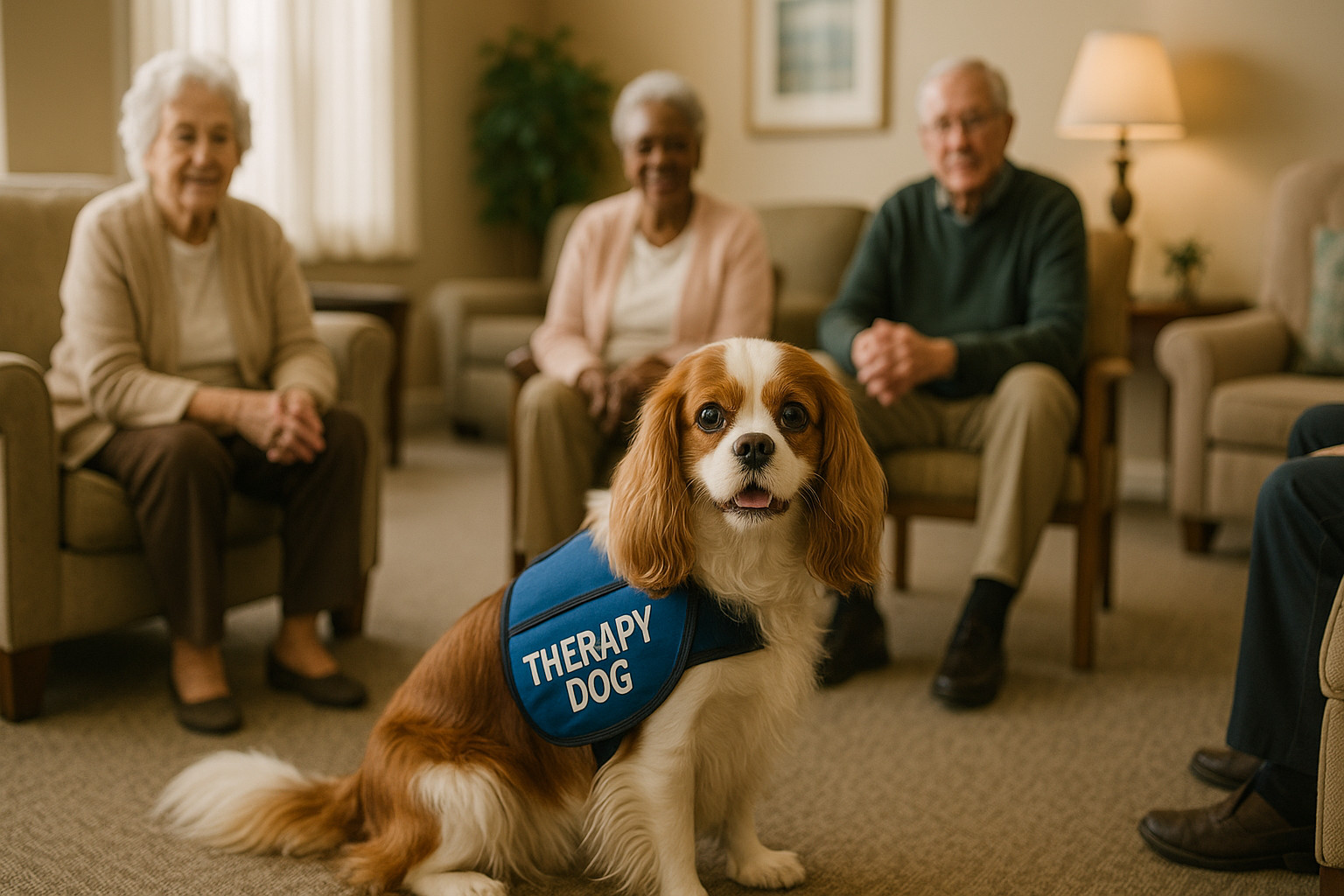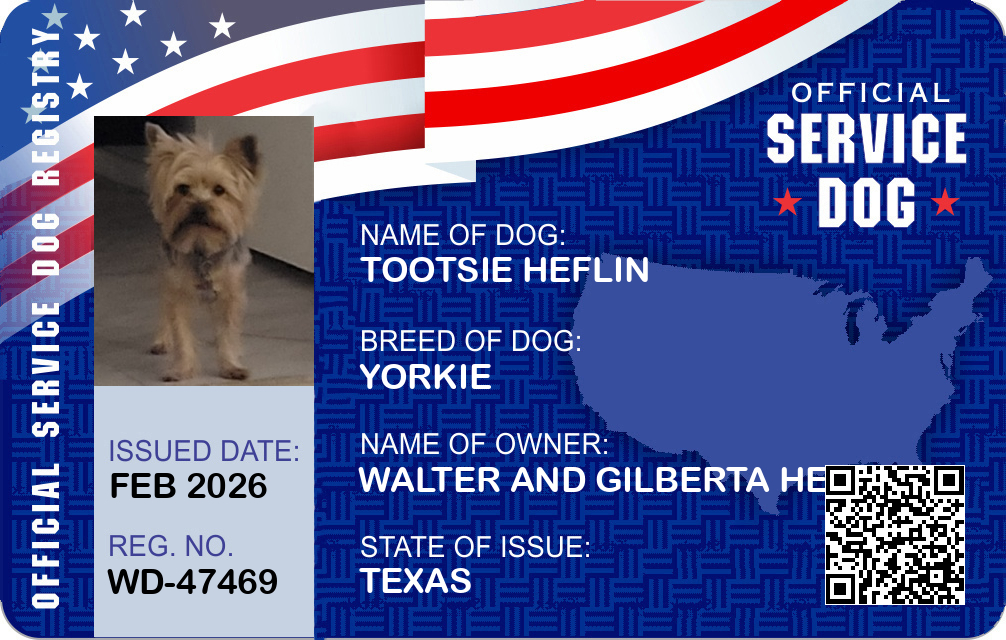Cavalier King Charles Spaniel as a Therapy Dog
Get Your Documents

Cavalier King Charles Spaniel as a Therapy Dog Overview
Therapy dogs play a crucial role in enhancing the quality of life for individuals in need of emotional support and comfort. Among the various breeds coveted for this purpose, the Cavalier King Charles Spaniel stands out due to its innate affectionate nature and adaptability. In this article, we’ll delve into the characteristics that make this breed a superb candidate for therapy work.
Understanding the Therapy Dog Role
Therapy dogs provide emotional support and comfort to individuals experiencing stress, trauma, or loneliness. Unlike service dogs, therapy dogs typically work in a variety of settings, such as hospitals, schools, and rehabilitation centers, interacting with diverse populations. The success of a therapy dog stems from temperament traits such as calmness, empathy, and sociability. For Cavalier King Charles Spaniels, their gentle demeanor, coupled with their love for human interaction, plays a pivotal role in their suitability for this role.
Physical Appearance and Energy Level
The Cavalier King Charles Spaniel is a small breed, weighing between 13 to 18 pounds, with a flowing, silky coat that gives them a charming and approachable appearance. Their moderate energy level is ideal for therapy work as they can engage with energy in play when required or sit calmly to provide comfort. Their size makes them easy to handle and ideal for settings where larger dogs might be overwhelming.
Personality and Emotional Intelligence
At the heart of a Cavalier’s appeal as a therapy dog is its extraordinary emotional intelligence. This breed exhibits a natural empathy, often sensing and responding to the emotional state of humans with remarkable accuracy. Cavaliers are affectionate, eager to bond, and thrive on human companionship, making them exceptional at providing emotional support. Their patient nature means they are not easily flustered, allowing them to remain composed in potentially stressful environments.
Environments Where Cavalier King Charles Spaniel Excels
Cavalier King Charles Spaniels thrive in environments that require a mix of tranquility and interaction. Their ability to adapt to both quiet and dynamic settings allows them to excel in hospitals, where they need to be gentle and composed, or in schools, where they can engage actively with children. Their amiable nature ensures they are well-received in a variety of scenarios, whether comforting an elderly person in a nursing home or participating in group therapy sessions.
Common Therapy Settings
- Hospitals: Cavaliers are adept at navigating the often sterile and emotion-laden hospital environments, offering comfort to patients enduring stress or lengthy recoveries.
- Nursing Homes: Their gentle and patient demeanor makes them perfect for spending time with elderly individuals, providing companionship and a gentle presence.
- Schools and Libraries: Whether involved in reading programs or offering companionship, Cavaliers can engage with children effectively, promoting joy and encouraging positive interactions.
- Rehabilitation Centers: They assist clients in overcoming emotional barriers, encouraging engagement in therapeutic exercises by providing a non-judgmental, warm presence.
Interactions with Different Populations
The Cavalier King Charles Spaniel’s versatility is evident in its ability to connect with a wide range of individuals:
- Children: Their gentle and tolerant nature makes Cavaliers ideal playmates and companions for young children, promoting positive social interactions.
- Elderly: Cavaliers’ ability to provide consistent and gentle companionship helps combat loneliness and enhances the emotional well-being of the elderly.
- Individuals with Autism: The calm and reassuring presence of a Cavalier can help reduce anxiety and foster a sense of calm among individuals on the autism spectrum.
- Patients with PTSD or Anxiety Disorders: Their empathetic nature allows Cavaliers to provide much-needed solace and comfort to individuals managing anxiety and trauma-related conditions.
Health and Wellness Factors
While Cavalier King Charles Spaniels possess numerous qualities favorable for therapy work, their health and maintenance require careful consideration. Regular grooming is essential to maintain their coat and reduce shedding, especially in clinical settings where hygiene is paramount. Additionally, routine veterinary care is vital to manage common health issues within the breed, ensuring they remain in good health for therapy visits.
Lifespan and Common Health Issues
Cavalier King Charles Spaniels typically have a lifespan of 9 to 14 years. However, the breed does have predispositions to certain health issues, including mitral valve disease, hip dysplasia, and syringomyelia. Potential therapy handlers should be informed and proactive in monitoring these conditions, as a dog’s health directly impacts its ability to perform therapy duties effectively and safely.
Maintenance and Care Needs
The Cavalier’s silky coat demands regular grooming to prevent matting and maintain a presentable appearance, essential for therapy visits. Regular grooming and dental care also keep them comfortable and free from discomfort. A balanced diet and regular exercise are crucial to maintaining their overall health and ensuring they remain vibrant and fit to fulfill their therapy roles.
Training and Certification Readiness
Cavalier King Charles Spaniels are known for their intelligence and eagerness to please, making them highly trainable. Their training should focus on building social skills, honing obedience, and acclimatizing them to varied stimuli they might encounter in therapy settings. Their patience, coupled with positive reinforcement methods, often leads to successful certification as therapy dogs.
Learning Style and Responsiveness
This breed responds exceptionally well to positive reinforcement training techniques, thriving on praise and affection. Their attentive nature makes them quick learners, capable of understanding complex cues required for therapy work. Regular socialization from a young age enhances their natural inclinations, ensuring they remain comfortable and well-behaved in diverse therapy settings.
Handling Social and Emotional Stimuli
Cavalier King Charles Spaniels exhibit a remarkable ability to handle social and emotional stimuli. Their calm demeanor and measured reactions to surprises or stressors help them maintain focus and provide comfort in varied situations. Cavaliers often mirror the emotional tone of their environment, offering relaxation when needed or exuberance during interactions that call for contagiously joyful engagement.
Strengths, Limitations, and Ideal Roles for Cavalier King Charles Spaniel
Strengths:
- Profound empathy and capacity to form deep emotional bonds with humans.
- Adaptability to diverse therapeutic environments and populations.
- Gentle temperament, coupled with resilience to noisy, bustling atmospheres.
Limitations:
- Susceptibility to health issues, requiring vigilant care and monitoring.
- Grooming needs may be demanding in environments where hygiene is crucial.
- Moderate energy level requires proper management to balance activity with rest.
Ideal Roles:
- Emotional support within hospital settings due to their calming influence.
- Companionship roles in schools, effectively engaging children.
- Participation in therapy sessions with individuals requiring emotional stability and comfort.
Final Thoughts
The Cavalier King Charles Spaniel stands as an exceptional candidate for therapy work, seamlessly blending affectionate nature with the intelligence and adaptability needed to thrive in diverse settings. Their emotional insight, coupled with their endearing presence, enables them to offer unparalleled comfort and joy to those in need. By maintaining their health and understanding their unique traits, therapy dog handlers can maximize their potential, transforming lives one gentle paw at a time.
Key Takeaways for the Cavalier King Charles Spaniel as a Therapy Dog
- Best suited for: Hospitals, schools, nursing homes, and rehabilitation centers.
- Not ideal for: Environments requiring high physical endurance or excessive strain.
- Temperament highlights: Affectionate, empathetic, adaptable, and patient.
- Care and health notes: Requires regular grooming; watch for breed-specific health issues.
- Therapy environments where they shine: Excelling as calming companions in diverse emotional and social settings.
Get Your Documents
Example State Cards













